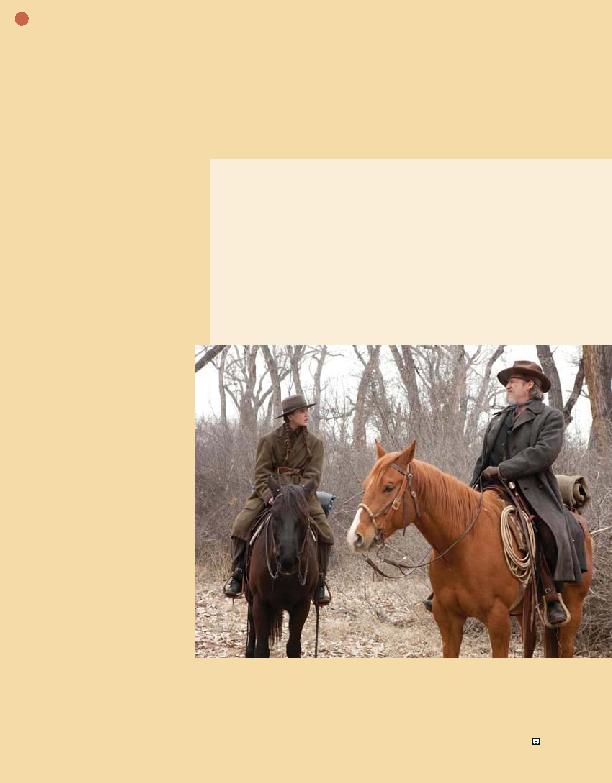
come up with on my own because that's
more interesting."
just start at the beginning and think it
through, write it through -- except, of
course, you have this furherer, this guide
which is the novel." It took the brothers "a
couple of months" to complete True Grit's
adaptation, which had very few subse-
quent rewrites.
rifle sends her hurtling into a pit, where
she's bitten by a snake and then rushed to
the nearest doctor by Rooster. As we see,
some 25 years later, her revengeful jour-
ney that ended in a snake bite ultimately
cost her an arm.
majeure that are seen as a punishment to
various groups of small-time sinners, it
might seem that True Grit's action-re-
action climax also suggests the inter-
vention of a higher power. As it turns
out, the Coens were simply following
Portis' structure and insist there isn't
anything else to it. "That's interesting,
it is force majeure... but we thought of
it more in terms of the kind of The
Perils of Pauline (the 1914 serial West-
ern) nature of that kind of adventure-
fiction," Joel explains. "As soon as
one thing happens, another thing
happens immediately afterwards, and
there's that willy-nilly action that
goes on. That was more of the way we
were -- we weren't really connecting
that in any way to the force majeure at
the end of Serious Man."
which the Coens could have inter-
rupted to allow the characters more
time to say their traditional goodbyes
(which is what the 1969 film did), but
ultimately they saw no point in stray-
ing from the novel they love. "That's
the end of that story," Joel says. "And
all that remains is the non-retrospective
part of this story -- the part that shows
you where she was coming from as she was
narrating it." Ethan summed it up to InCon-
tention.com: "The immediately striking thing
about the novel is it's a first-person story told
by this 14-year-old girl, well, actually she's
more like 40 talking about what happened
when she was 14."
ences see on the screen, but voiceover is
usually the one element that most filmmak-
ers will adjust because of the ease involved in
reconfiguring it. Sampled for your reading
pleasure is a quick glimpse into a longer,
tonally different final monologue for Mattie
that no longer appears in the film, even
though it did in the book:
could in the voiceover in the script, but
there just wasn't time," Ethan says. Inter-
estingly, the elimination of this monologue
helps maintain the true voice of the young
girl the audience has come to know since,
woman in her late forties, and the mono-
logue speaks to a woman's views much
more than a girl's.
that there is a sanctity to the simplicity of
their prose, dialogue, structure and transi-
tions, which prove that the simplest, clean-
est route to conveying information is always
ences with a narrative. The brothers are crea-
tures of habit who've made very few changes
to their process over the years and, when
asked what change stands out the most, Joel
reflects, "Using the computer. I mean, we
used to use a lot of Wite-Out."